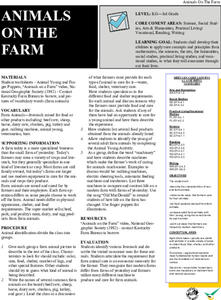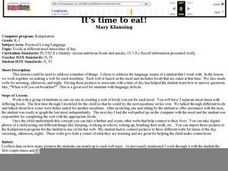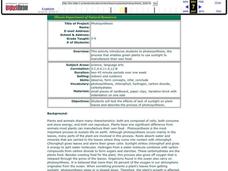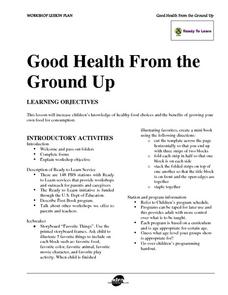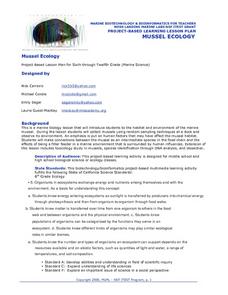Smithsonian Institution
Trait Tracker
Help mice beat the odds with an exciting activity about traits. Biologists discover the role of diet and other factors on animal traits by participating in a simulation activity. Teams collect and evaluate data to understand how certain...
Curated OER
Plankton in the Air
Here is a lab activity adequate for use with any full lesson on environmental factors that shape animal adaptations or marine animal characteristics. Pupils will discuss the role plankton plays in the environment and filter-feeding...
Teach Engineering
Engineers Love Pizza, Too!
Help overcome challenges in eating pizza. Scholars work in groups to design a device that assists a physically handicapped person eat pizza. They build a prototype of such a device to test their designs before building. To finish, groups...
Melissa Institute for Violence Prevention and Treatment
Concept Muraling
Concept muraling helps learners improve their comprehension of a text by giving them a way to organize their understanding of the key concepts in that text. Introduce readers to this process with a carefully scaffolded lesson plan that...
Teach Engineering
Clean it Up!
Harness the power of bacteria. Scholars see how using organisms that exist in nature can help solve human problems in the process known as bioremediation. They research and discuss several successful examples, such as using oil-eating...
University of Southern California
How do Organisms Interact?
Examine how organisms interact through a hands-on experience. Learners study population dynamics and distribution during an informative five-lesson unit. The focus is on the ocean environment and the organisms within it.
Beyond Benign
Ecological Footprint
How does your lifestyle measure up in terms of your ecological footprint? Young ecologists examine their impact on the planet using an insightful online calculator. A short quiz asks users to rank the size of their homes, their energy...
Curated OER
Feeding in the Flow
The National Oceanic and Atmospheric Administration (NOAA) has developed a tremendous library of ocean-themed lessons that can be used in a variety of science settings. "Feeding in the Flow" is one of those activities; Its focus is on...
Curated OER
Edible and Medicinal Plants: Field Trip Guide
Though it's designed to guide a field trip to the New York Botanical Garden, you could take resource like this one to a local park, wilderness area, school garden, or even a weedy empty lot. Middle schoolers identify plant parts and...
Curated OER
Birds - Beaks and Feet
Second graders use an online database to research information about bird's beaks and feet. Using that information, they discover what foods they eat and where they live. In groups, they cluster the food/habitat and beak/feet data to make...
Curated OER
Kitchen Vocabulary Words
Working in groups of four, class members sort cards, labeled with kitchen equipment vocabulary words, into groups based on function, i.e., mixing tools, measurement tools, serving tools, baking pans, stove top pans, or preparation tools....
Curated OER
Fill The Bill
Students identify and describe five different types of beaks. Using that information, they explain how each of them is adapted to feed on different foods. In groups, they travel around the room to various stations in order to practice...
Curated OER
Mammals
Students gather information from an online database about mammals. Choosing one mammal, they compare its physical characteristics, food habits, behavior and location to the other mammals they were introduced to in this lesson. In groups,...
Curated OER
Blast the Fats
Students examine the fats found in foods. In this nutrition lesson, students identify the types and amounts of fats found in foods as they research food labels and the Internet. Students classify the fats and record their data.
Curated OER
Animals on the Farm
Students work in groups to create a description of a farm animal. Other classmates try to guess the animal. The class discusses what farmers need to provide for each animal on their farm (food, shelter, veterinary care). Students...
Curated OER
Farmers - Caretakers of the Land
Students explore resource management, specifically farming. After reviewing vocabulary words, groups of students explore what is conserved by each practice. They compare and contrast responses. Students describe farming procedures which...
Curated OER
Galileo's Thermometer: Measuring the Density of Various Unknown Liquids
Sprouting scientists explore the concept of density by making mass and volume measurements for five different liquids. From these measurements, they calculate densities. They apply their learning to explain Galileo's thermometer works...
Curated OER
Seepy Sandwich
Students explore Earth science by participating in a pollution activity. In this water infiltration lesson plan, students utilize a water sprayer, food coloring and slices of bread to simulate how pollution can spread into our drinking...
Michigan State University
Biological Control
Student determine how to manage pests using biological control. They examine how knowledge of the pest's food chain is helpful in managing pests. Finally, they identify the three groups of biological control agents. They listen, take...
Curated OER
It's Time To Eat!
Young scholars explore the various types of nutritious foods that can be eaten at meal and snack times. they discuss the types of food they eat at mealtimes. Students use Kidspiration to create a web for each mealtime and each snack.
Curated OER
Moldy Jell-O
Mini mycologists plan an experiment to determine what affects the growth of mold on gelatin. A list of available materials is provided, but the procedure needs to be designed by the lab group. A data table is also provided in which to...
Curated OER
Photosynthesis
Learners are introduced to the process of photosynthesis. In groups, they test the effects of the lack of sunlight on plant leaves and compare the results with their hypothesis. They note the characteristics that plants and animals share...
Curated OER
Good Health from the Ground Up
Students examine healthy food choices and the benefits of growing their own food for consumption. They read the story "Favorite Things" and illustrate 5 favorite things. Students discuss types of foods that are healthy choices and why it...
Curated OER
Mussel Ecology
Students are introduced to the marine environment of the mussel. The emphasis of the lesson is upon what human factors are present to influence the environment in positive and negative ways. They brainstorm in groups in order to conduct...
















